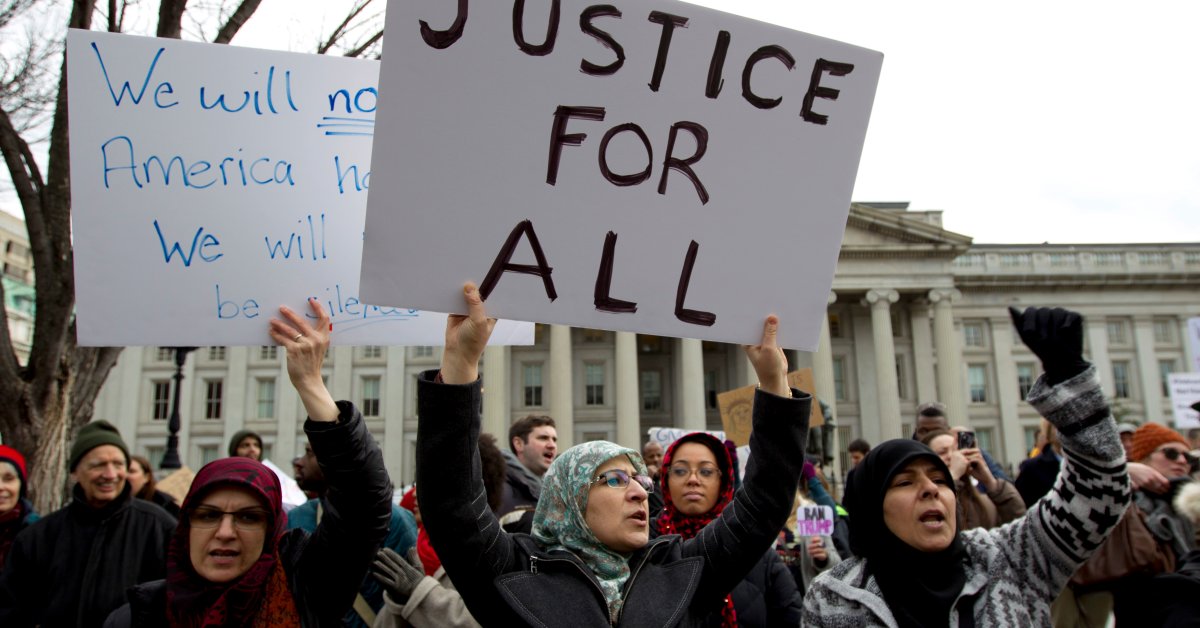
Translating…
(RICHMOND, Va.) — After theU.S. Supreme Courtroom upheld President Donald Trump’s banon travelers from a lot of predominantly Muslim international locations in 2018, the ruling gave the impact to shut down ethical challenges that claimed the policy used to be rooted in anti-Muslim bias.
However a federal appeals courtroom in Richmond is arena to listen to arguments from civil rights groups hoping to protect the challenges alive.
The 4th U.S. Circuit Courtroom of Appeals will hear arguments Tuesday in three courtroom cases filed by U.S. voters and eternal residents whose members of the family were unable to enter the U.S. as a result of commute ban, which used to be first imposed rapidly after Trump took office in January 2017.
The courtroom is being asked to resolve whether a federal resolve in Maryland made a mistake when he refused to push aside constitutional claims made in a lawsuit filed by the World Refugee Support Project in spite of a 2018 U.S. Supreme Courtroom ruling in a Hawaii case that found the commute ban “a legit grounding in national safety considerations.”
The Justice Division argues the excessive courtroom’s ruling successfully puts an cease to the ethical challenges. In a 5-4 ruling, a sharply divided Supreme Courtroom found that the commute ban used to be at some level of the worthy authority U.S. presidents get over immigration and their accountability for keeping the nation safe. The courtroom rejected claims that the policy used to be rooted in anti-Muslim bias essentially essentially based in neat fragment on Trump’s grasp tweets and public statements, including his call at some level of the presidential campaign for “a complete and complete shutdown of Muslims coming into the US.”
Trump has said the ban is geared toward making the U.S. safer from doubtless hostile foreigners.
“The Courtroom rejected the argument that the Proclamation can also fair be explained most efficient by anti-Muslim bias, and held as a change that the Proclamation used to be rationally grounded in legit national-safety considerations and distant places policy dreams,” Justice Division legal professionals argue in an ethical transient.
The Trump administration is asking the 4th Circuit to push aside the courtroom cases.
However the plaintiffs’ attorneys recount the Supreme Courtroom merely rejected a preliminary injunction to block the commute ban and failed to resolve the deserves of the constitutional claims. The plaintiffs order the commute ban violates a lot of constitutional rights, including the First Amendment’s Establishment Clause prohibiting the govt.from favoring one faith over but any other.
“The Trump administration has equipped extensive and damning proof of its discriminatory intent, time and time all all over again, so we’re hopeful that any courtroom — any excellent-minded observer — will see it the device we enact, that it is a Muslim ban that’s geared toward the Muslim personnel and Islam,’” said Gadeir Abbas, a senior litigation attorney with the Council on American-Islamic Relatives.
Federal appeals courts — including the 4th Circuit — had upheld rulings from federal judges who blocked the commute ban from taking construct. However the Supreme Courtroom came to a diversified conclusion.
Rep The Quick.Register to web the tip tales you should know real now.

Thank you!
On your safety, we now get sent a confirmation email to the tackle you entered. Click on the hyperlink to substantiate your subscription and starting up receiving our newsletters. When you accomplish now not glean the confirmation interior 10 minutes, please take a look at your junk mail folder.
The commute ban’s third iteration — now in construct— applies to travelers from Iran, Libya, Somalia, Syria and Yemen. It additionally impacts two non-Muslim international locations, keeping out travelers from North Korea and a few Venezuelan govt officials and their families.
The groups suing the Trump administration recount the 4th Circuit is now not being asked to resolve the deserves of the ethical challenges. They recount they are most efficient asking the appeals courtroom to search out — as U.S. District Courtroom Resolve Theodore Chuang did — that their courtroom cases can pass forward to the discovery fragment, after they’ll locate data from the Trump administration on the origins of the ban and the device it has been enforced over the final three years.
In rejecting the govt.s motion to push aside the courtroom cases, Chuang found that the plaintiffs “get equipped detailed allegations for why the (commute ban) is now not rationally connected to its said national safety interests and is as a change grounded in the illegitimate and unconstitutional aim of disadvantaging Muslims.”
Jonathan Turley, a professor at George Washington University Law College, said that while the Muslim groups can legitimately argue that the Supreme Courtroom failed to require outright dismissal of their ethical challenges, the excessive courtroom’s ruling did build a significant crimp in their arguments.
“It strikes me as willful blindness to faux the thought failed to considerably undermine these cases,” he said. “It’s very now not easy to read the Supreme Courtroom thought and never see worthy give a settle on to for the arguments of the administration.”
Justin Cox, an attorney with the World Refugee Support Project, said Muslim advocates will continue to strive and show masks that the ban is unconstitutional.
“I realize why they need us to pass away,” he said. “However nothing requires us to pass away and we’re going to protect combating.”
Contact usateditors@time.com.

